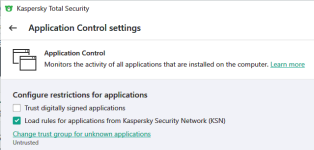Did someone submit it or was this automatic?
Kaspersky was also super aggressive in my testing at the cloud having a reaction. I had to recompile my sample with a bit more obfuscation midway through testing because it started getting blocked statically on other VMs after I clicked the button saying to undo.
No other AV I tested did this -- I suspect they required more than one or two hosts detecting a binary.
Maybe both automatic and manual submission! I'm not sure because I found it here last night and I didn't submit it:
https://opentip.kaspersky.com/C92E226D39B612785F8CE5074DA03DEEC6618E5C9AAEB4046AD153133B027805/
Now you would see in that report that in the extracted files category Kaspersky found one Adware but that wasn't there for some reason when I checked the first time. It appeared there later. You're maybe right about it requiring more than one host to detect a binary. I think most of the initial UDS based detection are hash based. KSN blacklists this suspicious items with hash as a first line of defense to protect other users. The detection here was "UDS:Hoax.Win64.FakeRansom.a" Here "a" surely refers to variants so if the sample is slightly modified then Kaspersky might not detect it at first launch on a new PC but later would create another UDS signature and maybe this time the variants would be different so something like "b" instead of "a". It may continue to be like this till a malware analyst personally analyze and create a proper signature. I've seen similar behavior for Microsoft for some other samples.
Interestingly Bitdefender and ESET has now created signature for this sample:
VirusTotal
Even Microsoft but I ran it in sanboxie with Windows Defender installed and WD didn't stop the sample from executing instead waited for me to open Windows Security and then I had to manually chose options but by that time the sample already did its job. This is detected by their cloud as some not so dangerous PUP it seems.
Edit: WD now detects it with a different signature: "Trojan:Win32/Wacatac.C!ml"


